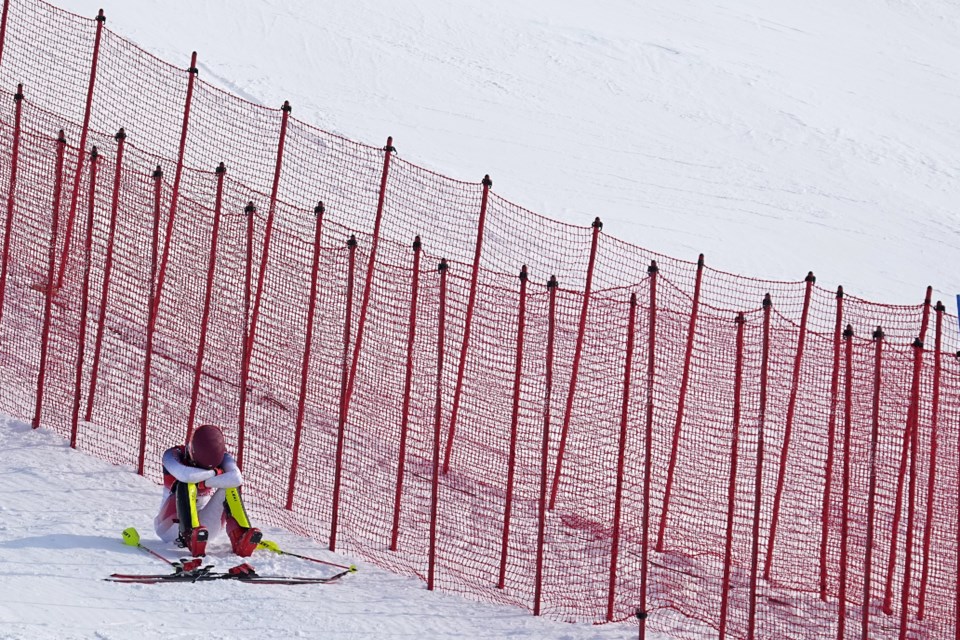BEIJING (AP) — When Mikaela Shiffrin careened off the course, another expected gold medal slipping away before she hardly got started, the announcers from NBC let her have it.
“One of the bigger shockers in Olympic alpine skiing history,” play-by-play man Dan Hicks bellowed.
“Almost a rookie mistake,” analyst Ted Ligety, a two-time gold medalist himself, chimed in harshly.
The cameras homed in on Shiffrin, who clicked out of her skis and plopped down on the artificial snow — head bowed, arms resting on bent knees — as she tried to process in the first run of the slalom.
NBC seemed determined to document every single one of Shiffrin's tears, to the point of failing to even show the next few skiers that took to the treacherous course known as Ice River.
In a different era, AKA before last summer, this sort of coverage would have been accepted, almost expected.
But times have changed since Simone Biles bared her mental-health issues to the world at the Tokyo Games, and other athletes have followed her lead.
In that emerging context, it wasn't surprising at all for social media to quickly turn its wrath on the network that had banked so much of its coverage on Shiffrin –°¿∂ ”∆µ one of the biggest stars.
“Some really shameful coverage by NBC of Michaela Schiffrin,” tweeted. “Just pure trauma porn for their ratings instead of treating her like a human.”
“NBC NEEDS TO STOP TORTURING MIKAELA SCHIFFRIN!!” posted.
All of which raises some interesting dilemmas:
Is it still OK to criticize a much-hyped athlete who fails to meet expectations at a huge event such as the Winter Olympics?
How long should we linger on their disappointment before it looks more like ambulance chasing than legitimate coverage?
These are the sort of questions that journalists have long grappled with, but Biles' ordeal in Tokyo — where of one event after another, not feeling she was mentally prepared to compete — has added a whole new layer to the discussion.
Athletes from to to have openly addressed their fragile mental states and the emotional toll it takes to compete at the highest levels.
But journalists, whether we work for a network that pays billions to televise the Olympics or represent an athlete's hometown newspaper, have a job to do.
We must tell the story openly, honestly, without the glare of stars in our eyes.
In fairness to NBC, the network surely would've been accused of coddling one of its most valued Olympics assets if the coverage had quickly cut away after Shiffrin tumbling out of the slalom after just a few seconds — a result even more shocking because in her first event of these Games, the giant slalom.
Shiffrin was certainly gracious, honest and revealing in her interview with NBC, just as she was during a long, tedious journey through the mixed zone, where the rest of the world's media was gathered.
“Pretty much everything makes me second-guess the last 15 years,” Shiffrin told NBC's Todd Lewis. “Everything I thought I knew about my own skiing and slalom and racing mentality.”
She was the first to concede that these Winter Games have not in any way gone as she had hoped and planned. NBC's coverage, even if teetered on exploitive, in no way changes that reality.
“It feels like a really big letdown,” the two-time Olympic gold medalist said, her cheeks moist with tears.
No matter how much pressure we in the media put on athletes, most will tell you it's nowhere near the amount of pressure that they put on themselves.
Shiffrin was feeling that burden before she ever climbed the mountain, knowing that it was essentially gold-or-bust for a skier who had become about as automatic as the tides.
Yet at these Olympics, in her two best events, she's managed to stay on the course for a total of less than 20 seconds.
“It really feels like a lot of work for nothing,” she said, her words oozing with heartbreak.
In retrospect, Shiffrin was not in the best place mentally or physically coming into Beijing.
She's still reeling from the death of her father, Jeff, who passed away two years ago from a severe head injury after an accident at the family's Colorado home.
Not to mention, her training was hampered by a back problem in October and November, which was followed by a bout with COVID-19 in late December.
Still, no one expected this.
Least of all, Shiffrin.
"I’ve never been in this position before,” she said, “and I don’t know how to handle it.”
Those are lessons she'll have to learn in the days and weeks and lifetime to come.
In the meantime, those of us who document these journeys for the rest of the world must look into ways we can do our jobs with more compassion and empathy, without scrimping on the painful parts of the story.
Shiffrin won't be the last athlete to fall.
We can't catch them, but perhaps we can make the landing a little less painful.
___
Paul Newberry is a national sports columnist for The Associated Press. Write to him at pnewberry(at)ap.org or at https://twitter.com/pnewberry1963 and check out his work at https://apnews.com/search/paulnewberry
___
More AP Winter Olympics: https://apnews.com/hub/winter-olympics and https://twitter.com/AP_Sports
Paul Newberry, The Associated Press


